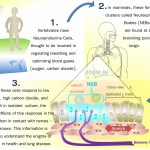Serotonin
Congratulations to Nicolle Domnik, this year's winner of the new Dr. Dolittle Travel Award to present her research at the annual Experimental Biology conference in San Diego, CA in April. Nicolle is currently a graduate student in the Department of Biomedical and Molecular Sciences at Queen's University in Canada. The award criteria included the submission of a guest blog entry based on the research she will be presenting at the Experimental Biology conference (N Domnik, SG Vincent, E Cutz, JT Fisher. Murine airway slowly-adapting receptor responses to lung inflation: A role for serotonin?…
This post is part of a Nature Blog Focus on hallucinogenic drugs in medicine and mental health, inspired by a recent Nature Reviews Neuroscience paper, The neurobiology of psychedelic drugs: implications for the treatment of mood disorders, by Franz Vollenweider & Michael Kometer. This article will be freely available, with registration, until September 23. See the Table of Contents for more information on this Blog Focus, and read the other blog posts:
Serotonin, Psychedelics and Depression (by Neuroskeptic)
Ketamine for Depression: Yay or Neigh? (by The Neurocritic)
Visions…
After I wrote in my Atlantic article about getting my serotonin transporter gene assayed (which revealed that I carry that gene's apparently more plastic short-short form), I started getting a lot of email â several a week â from readers asking how to have their SERT gene tested. This led to an interesting hunt.
It was a hard question to answer. I couldn't just tell people to do what I did, for a psychiatric researcher/MD I'd known for years, who specializes in depression and serotonin, had done mine as a sort of favor to science and journalism. That researcher also stood by, had I needed…
Jonah Lehrer's story on "Depression's Upside" has created quite a kerfuffle. The idea he explores â that depression creates an analytic, ruminative focus that generates useful insight â sits badly with quite a few people. It's not a brand-new idea, by any means; as Jonah notes, it goes back at least to Aristotle. But Jonah (who â disclosure department â is a friend; plus I write for the Times Magazine, where the piece was published) has stirred the pot with an update drawing from (among other things) a very long review paper published last year by psychiatric researchers Paul Andrews and…
I'm not vulnerable, just especially plastic. Risk genes, environment, and evolution, in the Atlantic
The video interview above, with NIH primatologist Stephen Suomi, is embedded within a feature of mine that that appeared today at The Atlantic website -- and is in the December 2009 issue now shipping -- about a new hypothesis in behavioral genetics.
This emerging hypothesis, which draws on substantial data, much of which has gone simply unnoticed or unremarked, I call the "orchid-gene hypothesis," for lack of a better name. Some of the researchers have other offerings. It's been around for several years but is now blooming as evidence accumulates. When I came across it at a conference this…
tags: TEDTalks, medicine, Psychopathic Killers, epigenetics, brain damage, psychology, MAOA gene, serotonin, Jim Fallon, streaming video
Psychopathic killers are the basis for some must-watch TV, but what really makes them tick? Neuroscientist Jim Fallon talks about brain scans and genetic analysis that may uncover the rotten wiring in the nature (and nurture) of murderers. In a too-strange-for-fiction twist, he shares a fascinating family history that makes his work chillingly personal [4:42]
TEDTalks is a daily video podcast of the best talks and performances from the TED Conference,…
Big psych news of the day is that a big JAMA study debunked the "depression gene" -- that is, this big new study (by Risch et alia, in JAMA, today) found that, contrary to a famous earlier big study (Caspi et alia, in Science, 2003), the short ("bad") form of a particular gene called 5-HTT does NOT make a person more vulnerable to depression. Or, to flip it:: Caspi 2003 had found that having a short version of 5-HTT, which affects processing of serotonin, put someone at more risk of depression if they experienced (as adults) repeated stressful life events. Risch 2009, crunching data from a…
Notables from my morning feedscan:
The vision folks at Barrow study "Where's Waldo?" to figure out search strategies.
A virtual-reality helmet claims to to feed all five senses. Interesting if true.
Winner best-and-worsrt headline writing in a press release: Prawnography shows captive bred prawns lack lust And in second place, running, um, close behind: Scatological clues lead to an intimate view, which actually looks at some pretty interesting group dynamics in lemurs during their annual birthing time, when babies are at risk of being murdered.
Neurotopia continues a good series on the…
Serotonin is a chemical jack-of-all-trades. It relays messages between the cells of the brain and in doing so, controls everything from anger to sleep, body temperature to appetite. But in one insect, it is the key to Pandora's box, periodically unleashing some of the most destructive swarms on the planet. It is the chemical responsible for turning solitary desert locusts into massive plagues.
With desert locusts, you get two insects for the price of one. For most of their lives, they are positively antisocial and will avoid other locusts - a far cry from the devastating swarms that farmers…
